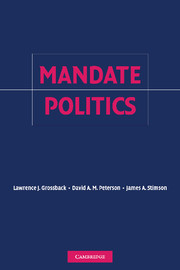Book contents
- Frontmatter
- Contents
- List of Figures
- List of Tables
- Preface
- Acknowledgments
- 1 A Single Time in a Single Place
- 2 The Evolution of Mandates
- 3 Members of Congress Respond
- 4 The Pattern of Congressional Response
- 5 Consequences
- 6 The Irresistible Meets the Unmovable
- 7 Conclusion: A Mandate View of Normal American Politics
- Bibliography
- Index
4 - The Pattern of Congressional Response
Published online by Cambridge University Press: 14 August 2009
- Frontmatter
- Contents
- List of Figures
- List of Tables
- Preface
- Acknowledgments
- 1 A Single Time in a Single Place
- 2 The Evolution of Mandates
- 3 Members of Congress Respond
- 4 The Pattern of Congressional Response
- 5 Consequences
- 6 The Irresistible Meets the Unmovable
- 7 Conclusion: A Mandate View of Normal American Politics
- Bibliography
- Index
Summary
In legislatures, we care about individual votes because we want to understand why members vote as they do. We care about aggregate outcomes because they become public policy. The task of this chapter is to come to terms with the aggregate, to ask how mandates affect which side wins and loses, and how the strength of the winning coalition affects the content of the proposals that become law.
Our opening assumption is that change at the individual level surely heralds some kind of change in aggregate outcomes. But aggregation of individual behaviors into institutional outcomes leaves room for diminution, for exaggeration, and for subtle transformation of the individual impetus in the vote. Thus, we expect to see mandate in-fluences in the institution, having seen them in votes, but it is by no means obvious that they will be the same as what we have already seen.
Our task in this chapter is threefold. First we look at aggregate evidence of voting in Congress to see whether the patterns of individual movement in response to mandate perceptions leave their mark on aggregate voting outcomes. This analysis treats the institution as simply an aggregate of its members. Then we pursue institutional theories for a more sophisticated understanding of how both election results and, independently, their perceived meaning, translate individual into institutional change. And, last, we return to the measures of aggregate change to see if they are responsive to the time-varying signals of the meaning of the previous election.
- Type
- Chapter
- Information
- Mandate Politics , pp. 106 - 130Publisher: Cambridge University PressPrint publication year: 2006



